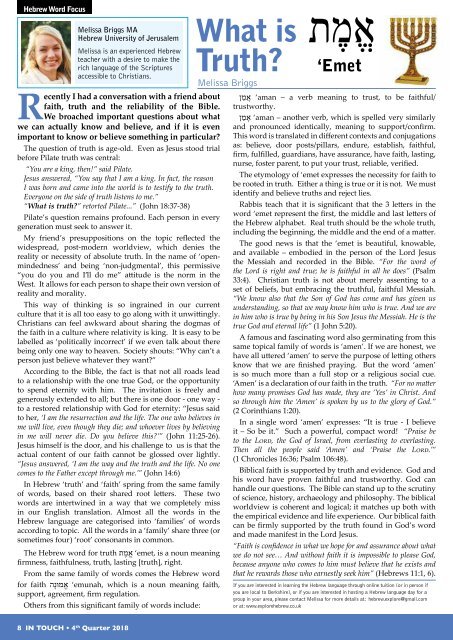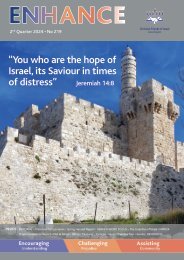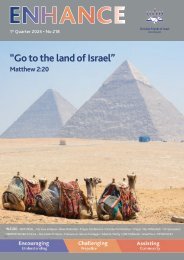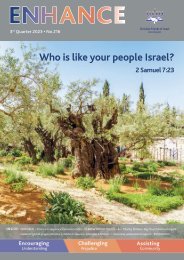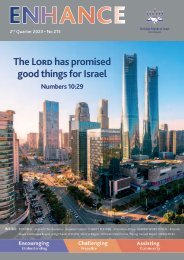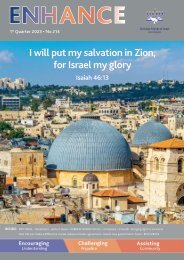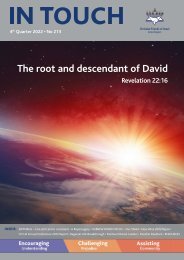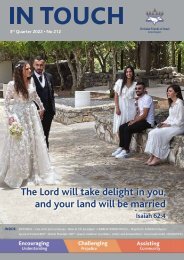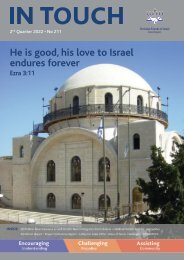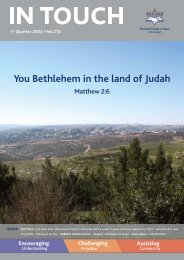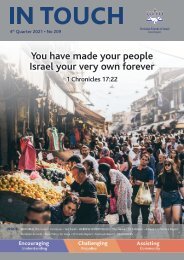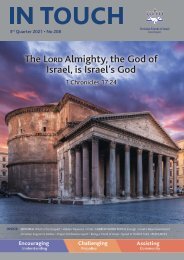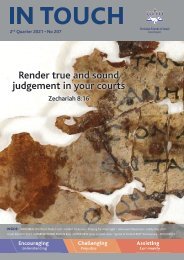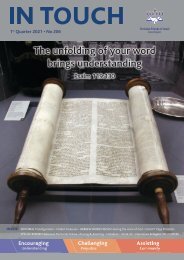In Touch Quarter 4 - 2018
The final edition of our magazine for 2018
The final edition of our magazine for 2018
- No tags were found...
Create successful ePaper yourself
Turn your PDF publications into a flip-book with our unique Google optimized e-Paper software.
Hebrew Word Focus<br />
Melissa Briggs MA<br />
Hebrew University of Jerusalem<br />
Melissa is an experienced Hebrew<br />
teacher with a desire to make the<br />
rich language of the Scriptures<br />
accessible to Christians.<br />
Recently I had a conversation with a friend about<br />
faith, truth and the reliability of the Bible.<br />
We broached important questions about what<br />
we can actually know and believe, and if it is even<br />
important to know or believe something in particular?<br />
The question of truth is age-old. Even as Jesus stood trial<br />
before Pilate truth was central:<br />
“You are a king, then!” said Pilate.<br />
Jesus answered, “You say that I am a king. <strong>In</strong> fact, the reason<br />
I was born and came into the world is to testify to the truth.<br />
Everyone on the side of truth listens to me.”<br />
“What is truth?” retorted Pilate...” (John 18:37-38)<br />
Pilate’s question remains profound. Each person in every<br />
generation must seek to answer it.<br />
My friend’s presuppositions on the topic reflected the<br />
widespread, post-modern worldview, which denies the<br />
reality or necessity of absolute truth. <strong>In</strong> the name of ‘openmindedness’<br />
and being ‘non-judgmental’, this permissive<br />
“you do you and I’ll do me” attitude is the norm in the<br />
West. It allows for each person to shape their own version of<br />
reality and morality.<br />
This way of thinking is so ingrained in our current<br />
culture that it is all too easy to go along with it unwittingly.<br />
Christians can feel awkward about sharing the dogmas of<br />
the faith in a culture where relativity is king. It is easy to be<br />
labelled as ‘politically incorrect’ if we even talk about there<br />
being only one way to heaven. Society shouts: “Why can’t a<br />
person just believe whatever they want?”<br />
According to the Bible, the fact is that not all roads lead<br />
to a relationship with the one true God, or the opportunity<br />
to spend eternity with him. The invitation is freely and<br />
generously extended to all; but there is one door - one way -<br />
to a restored relationship with God for eternity: “Jesus said<br />
to her, ‘I am the resurrection and the life. The one who believes in<br />
me will live, even though they die; and whoever lives by believing<br />
in me will never die. Do you believe this?’” (John 11:25-26).<br />
Jesus himself is the door, and his challenge to us is that the<br />
actual content of our faith cannot be glossed over lightly.<br />
“Jesus answered, ‘I am the way and the truth and the life. No one<br />
comes to the Father except through me.’” (John 14:6)<br />
<strong>In</strong> Hebrew ‘truth’ and ‘faith’ spring from the same family<br />
of words, based on their shared root letters. These two<br />
words are intertwined in a way that we completely miss<br />
in our English translation. Almost all the words in the<br />
Hebrew language are categorised into ‘families’ of words<br />
according to topic. All the words in a ‘family’ share three (or<br />
sometimes four) ‘root’ consonants in common.<br />
The Hebrew word for truth מֶ ת ‘emet, אֱ is a noun meaning<br />
firmness, faithfulness, truth, lasting [truth], right.<br />
From the same family of words comes the Hebrew word<br />
for faith אֱ מּונָה ‘emunah, which is a noun meaning faith,<br />
support, agreement, firm regulation.<br />
Others from this significant family of words include:<br />
What is<br />
Truth?<br />
Melissa Briggs<br />
אֱ מֶ ת<br />
‘Emet<br />
faithful/ aman‘אֲ – a verb meaning to trust, to be מַ ן<br />
trustworthy.<br />
aman‘אָ – another verb, which is spelled very similarly מַ ן<br />
and pronounced identically, meaning to support/confirm.<br />
This word is translated in different contexts and conjugations<br />
as: believe, door posts/pillars, endure, establish, faithful,<br />
firm, fulfilled, guardians, have assurance, have faith, lasting,<br />
nurse, foster parent, to put your trust, reliable, verified.<br />
The etymology of ‘emet expresses the necessity for faith to<br />
be rooted in truth. Either a thing is true or it is not. We must<br />
identify and believe truths and reject lies.<br />
Rabbis teach that it is significant that the 3 letters in the<br />
word ‘emet represent the first, the middle and last letters of<br />
the Hebrew alphabet. Real truth should be the whole truth,<br />
including the beginning, the middle and the end of a matter.<br />
The good news is that the ‘emet is beautiful, knowable,<br />
and available – embodied in the person of the Lord Jesus<br />
the Messiah and recorded in the Bible. “For the word of<br />
the Lord is right and true; he is faithful in all he does” (Psalm<br />
33:4). Christian truth is not about merely assenting to a<br />
set of beliefs, but embracing the truthful, faithful Messiah.<br />
“We know also that the Son of God has come and has given us<br />
understanding, so that we may know him who is true. And we are<br />
in him who is true by being in his Son Jesus the Messiah. He is the<br />
true God and eternal life” (1 John 5:20).<br />
A famous and fascinating word also germinating from this<br />
same topical family of words is ‘amen’. If we are honest, we<br />
have all uttered ‘amen’ to serve the purpose of letting others<br />
know that we are finished praying. But the word ‘amen’<br />
is so much more than a full stop or a religious social cue.<br />
‘Amen’ is a declaration of our faith in the truth. “For no matter<br />
how many promises God has made, they are ‘Yes’ in Christ. And<br />
so through him the ‘Amen’ is spoken by us to the glory of God.”<br />
(2 Corinthians 1:20).<br />
<strong>In</strong> a single word ‘amen’ expresses: “It is true - I believe<br />
it – So be it.” Such a powerful, compact word! “Praise be<br />
to the Lord, the God of Israel, from everlasting to everlasting.<br />
Then all the people said ‘Amen’ and ‘Praise the Lord.’”<br />
(1 Chronicles 16:36; Psalm 106:48).<br />
Biblical faith is supported by truth and evidence. God and<br />
his word have proven faithful and trustworthy. God can<br />
handle our questions. The Bible can stand up to the scrutiny<br />
of science, history, archaeology and philosophy. The biblical<br />
worldview is coherent and logical; it matches up both with<br />
the empirical evidence and life experience. Our biblical faith<br />
can be firmly supported by the truth found in God’s word<br />
and made manifest in the Lord Jesus.<br />
“Faith is confidence in what we hope for and assurance about what<br />
we do not see… And without faith it is impossible to please God,<br />
because anyone who comes to him must believe that he exists and<br />
that he rewards those who earnestly seek him” (Hebrews 11:1, 6).<br />
If you are interested in learning the Hebrew language through online tuition (or in person if<br />
you are local to Berkshire), or if you are interested in hosting a Hebrew language day for a<br />
group in your area, please contact Melissa for more details at: hebrew.explore@gmail.com<br />
or at: www.explorehebrew.co.uk<br />
8 IN TOUCH • 4 th <strong>Quarter</strong> <strong>2018</strong>


